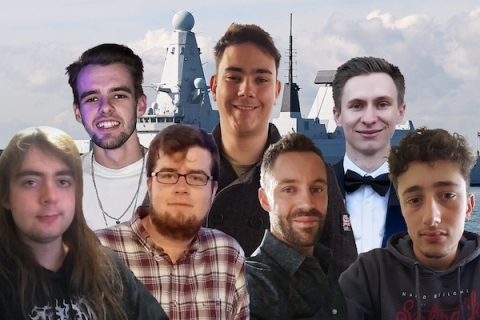

BA (Hons) Film Production student Cristian-ļonut Necula had a taste of working in the film industry last month by flying out to Morocco for 3 weeks to work on a feature film shot by School of Film, Media and Communication lecturer Ben Hodgson.
He explains what it was like to work on a live film set, the highlights and challenges, and how the experience has helped shape his skills and knowledge.
Cristian's story
My role was camera assistant and data wrangler, and until we got to the set I still wasn't sure what duties I would take on. This film was shot with two units: Ben, cinematographer, was on camera A, while Mark Moreve (2nd Unit Director of Photography) was in charge of camera B. Both had a pair of camera assistants, a focus puller and a clapper-loader. My place in the hierarchy was at the bottom of the camera department, as a trainee.
On the first day, Ben went on a tech recee with the producers and director, while Mark and I – along with the Moroccan assistant camerapersons (ACs) – tested two Sony F55s with Zeiss Super Speed primes, kitted with Tilta Nucleus-M and Teradek wireless systems. We also had smaller cameras that could be used as 'crash-cams', or on lighter-weight rigs: a Sony FS5, Sony A7SII and a Z-Cam E2. The tests involved shooting colour charts with every combination of the A and B camera and the primes, and setting up the additional cameras on gimbals.
The three weeks were intense, with long shooting days from sunrise to sunset; we only had Sundays off. The prospect seemed daunting at first, but I quickly got used to waking up at 6am and returning to the hotel in the evening after 12 hours of work. Something I couldn't predict, though, was how to cope with the weather: the mornings and evenings were freezing cold, but any time between 10am and 7pm was as hot as UK in the summer – around 25°C.
On set, my responsibilities were helping the ACs switch lenses, filters and batteries, alongside prepping any rigs with the additional cameras, setting up video village and helping the camera department with whatever was needed. The data-wrangling wasn't as extensive as expected because the editor was on set as a digital image technician. Therefore, I only had to deliver the media from the camera to him, and keep reports with details on which lens was used on each camera, as well as the card each shot was on.
One highlight of this experience was seeing departments collaborate and how Ben works as a cinematographer, with help from the gaffer and key grip whose portfolios include incredible titles like Spectre, Game of Thrones, Babel and Black Hawk Down. It was really cool seeing how they lit day-for-night, used a 12K HMI (hydragyrum medium-arc iodide) light as a moonlight, and even created a sandstorm inside a building. I particularly liked the use of volumetric light.
The rigs were also interesting, especially how quickly they built a dolly – but I was really impressed by the combination of the jib and dolly, and its great movement and flexibility. These seem like intricate and heavy builds, but nothing stopped the grips from taking them up the rocky hills where we were shooting. The cameras also came with a just-as-bulky Angenieux Optimo 24–290mm T2.8 zoom, an amazing lens that you can shoot an entire film with, without needing other glass.
There were some difficult days, e.g. when we had to shoot at night, or going alone with the 2nd Unit for pick-ups. It wasn't fun being in a car or unpaved roads, but climbing over hills hefting equipment was another level. Nonetheless, about half of the shoots took place at the Atlas Studios, so it wasn't always that extreme. It was impressive seeing all the built sets, how real they seemed, and discovering what films had used them before such as The Mummy, Gladiator and Kingdom of Heaven.
I learned a lot being on set, especially in such tough environments and weather – even just shadowing and helping the ACs taught me a bit about set etiquette. The multi-cam shoot setup was novel to me, so taking part in it and observing the different workflow was very valuable. There were also times when Ben let me operate Camera A for a few rehearsals while he and David Batty (Director) watched the feed behind the monitor.
Overall, it was a great experience that taught me a lot, opened my eyes to what the industry's like, and further convinced me that I want to pursue filmmaking as a career.
